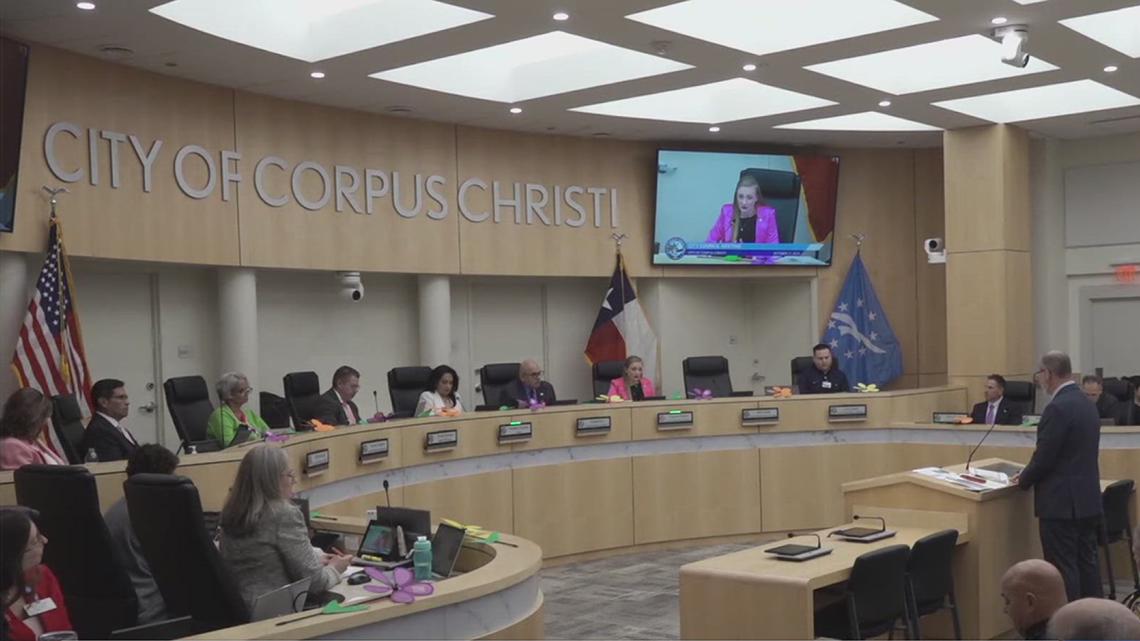Facing critical lake levels, Corpus Christi leaders back the $169M Evangeline deal and a $2.7M Nueces River Authority reservation to boost long-term supply.
CORPUS CHRISTI, Texas — The Corpus Christi City Council on Tuesday approved more than $171 million in new water measures as the city faces worsening drought conditions and growing national attention on its supply challenges.
RELATED: Lake Corpus Christi is drying up and small towns are feeling it
Council members first approved a $169 million contract with the Evangeline Water Group to purchase groundwater rights near Sinton. City Manager Peter Zanoni said the total project cost is expected to reach “right around $370 million” once the city constructs the wells, pipelines and other infrastructure needed to deliver up to 24 million gallons a day. The first water is expected to flow in late 2026, when the city plans to stop drawing from Lake Corpus Christi and Choke Canyon Reservoir.
That vote passed 7-1, with Councilman Roland Barrera opposed and Councilman Mark Scott absent.
Later Tuesday, the council approved a $2.7 million nonrefundable reservation fee with the Nueces River Authority to reserve up to 50 million gallons per day from a proposed desalination facility on Harbor Island. The measure passed 5-3, with Mayor Paulette Guajardo and Councilmembers Sylvia Campos and Barrera voting against it.
Zanoni said he believes the partnership with the NRA will be positive for the city. “We’ll have a good relationship with the Nueces River Authority,” he said.
But Mayor Guajardo said she doesn’t believe there is enough information to move forward. She and Barrera both cited the lack of a business plan and questioned the timeline for the Harbor Island project.
Guajardo said she was told the plant could be operational by December 2029 but noted that NRA Executive Director John Byrum initially gave her a 2031 estimate.
“Thank you for your comments; we take them to heart,” Byrum said in response.
When Guajardo asked whether the authority planned to sell water to Coastal Bend industrial customers, Byrum said, “I do not want to sell water in the Coastal Bend.”
“The answer has not been ‘no,’” Guajardo replied. “The answer is ‘I don’t want to.’”
Councilwoman Kaylynn Paxton supported the reservation, saying it made sense to act now while the opportunity was available.
“Once we get to that point where we’re actually signing a water contract, we can reevaluate,” Paxton said. “But to me, it’s important to take as much water as possible under reservation because we have more to work with, whereas once we get the project online, if we determine we needed more, it may or may not be available.”
Councilwoman Carolyn Vaughn added that she was willing to trust the NRA’s commitment. “You have said from the beginning you will not sell to our customers,” Vaughn said. “I’m going to trust you.”
The vote doesn’t guarantee the city will receive desalinated water, but it does secure a place in line should the project move forward.
Meanwhile, officials in Sinton, where the Evangeline wells will be located, said they’re still seeking stronger communication from Corpus Christi.
Sinton City Manager John Hobson said the agreement reassures his city that Corpus Christi will be responsible for any impacts the new wells may cause.
“It doesn’t really change much for us,” Hobson said. “It lets us know that the City of Corpus Christi will mitigate any problems that they cause with the wells, but it doesn’t change our focus on the overall project.”
Hobson said communication from Corpus Christi had been “very little,” though he believes that will improve.
“The city manager has committed to being more persistent with communication,” he said.
He also said he is working with Zanoni to coordinate a town hall meeting in San Patricio County.
“I think they should absolutely spend more time in San Patricio County,” Hobson said. “Mr. Zanoni had talked about having a town hall meeting in Sinton, and we’re working to coordinate that with him.”
Hobson said his city remains cautious but committed to what’s best for residents.
“If for some reason the wells for the Evangeline project disrupt our wells, the City of Corpus Christi is financially responsible based on this interlocal agreement to fix it,” he said. “We’re gonna continue with this project, and we’re not necessarily supporting it, but we’re gonna move forward with what’s best for our residents.”

